外研社高中英语选修第七册第三单元知识点培训资料
- 格式:doc
- 大小:39.50 KB
- 文档页数:14
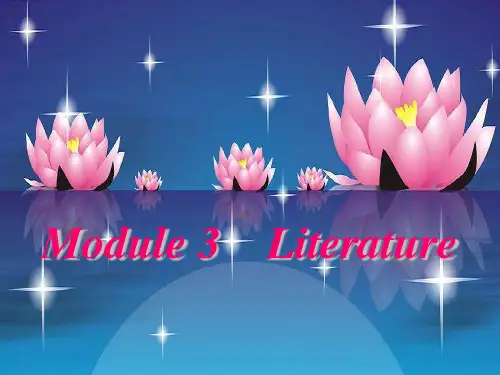
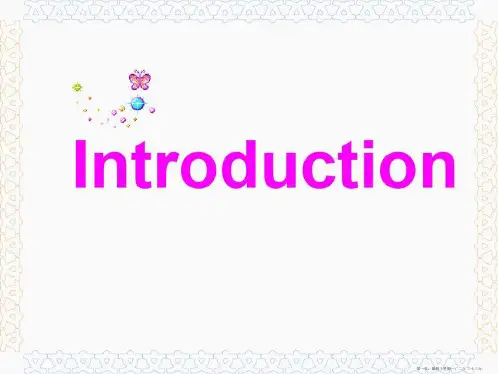
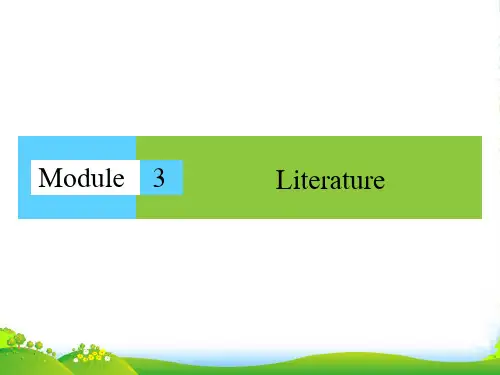

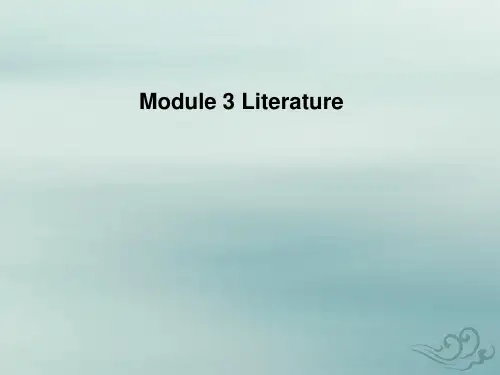
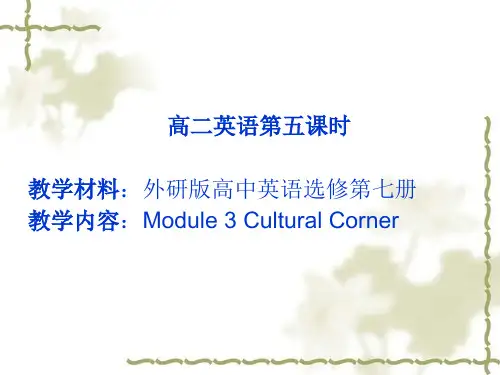
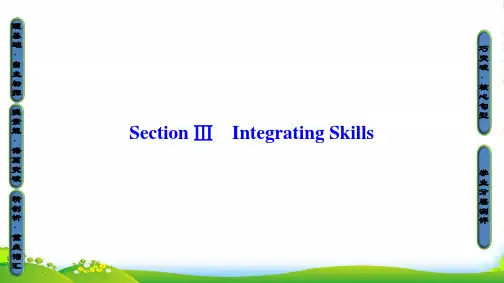
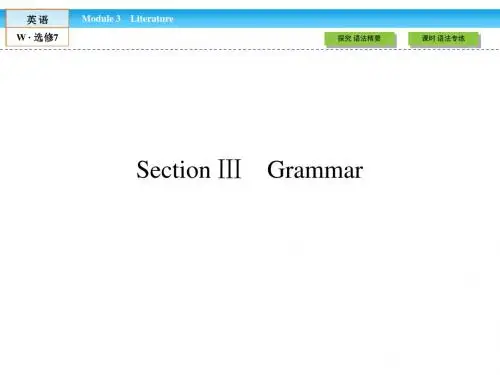

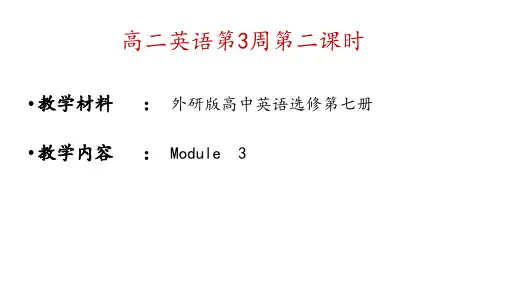
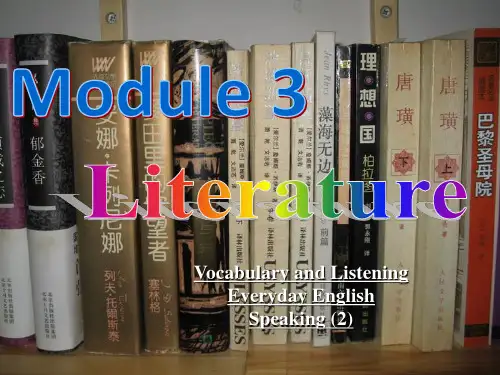
外研社高中英语选修第七册第三单元知识点Module 3 LiteratureⅠ.单词荟萃1. _______ n.小说家→novel n.小说2.scene n.场景;场面→ _______ n.风景3.serve v.端上(饭菜等)→ _______n.服务;效力4.intend v.打算→intention n.意图;本来想法→ __________ adj.有意的;故意的5.illegally adv.违法地;非法地→ ______ adj.非法的→ legal adj.合法的6. _________ v.分发,分配,分送→distribution n.分发;分配7. _____ n.烟雾→ smoke n.烟 v.吸烟;冒烟→ fog n.雾8. __________ n.挨饿,饿死→starve v.饿死;使挨饿9. ___________ v.积累→accumulation n.积累10. ___________v.完成(任务等),取得(成功)→ accomplished adj.完成了的;竣工的→ accomplishment n.完成11. ________ adj.铤而走险的;绝望的;极度渴望的→ __________ adv.拼命地,绝望地→ desperation n.拼命,不顾一切Ⅱ.短语检测1.因……而发狂2.盯着……看,凝视3.精心挑选;认出来;辨认出来4.紧紧抓住5.以……声音(说)6.张贴告示7.刚一……就8.突然抱住某人9.使人伤心10.犯了罪11.感到自在12.没有利害关系的;不重要的13.仅仅因为这个原因Ⅲ.佳句再现1.Each boy was _______ one bowl of soup and no more,____________________________ he was given another 60 grams of bread.每个孩子只可分得一碗粥,绝不多给,除非是特别的节日,他们才可以另外再分到60克的面包。
2. The bowls never _______________ , as the boys cleaned them with their spoons, ___________ every bit of soup.粥碗从来用不着洗,孩子们非用汤匙把碗刮得重又明光铮亮了才住手,试图吃掉每一点粥。
3.When they ___________ their bowls in this way,they _________________ the pot with eager eyes,as if they wanted to eat it.他们这样把碗刮干净以后,就会坐在那里,眼巴巴地瞅着汤锅,似乎要把它也吞进肚里。
4. ________ at least thirty seconds had passed, _______________________.至少过了三十秒钟,这个男人才说出话来。
5. _____________ the boy spoken these words than the warden hit him on the head with the soup spoon. 孩子的话刚出口,大师傅就操起勺子狠狠地敲他的脑袋。
Ⅳ.单元语法Inversion used for emphasis and emphatic sentences单词点睛1serve v.端上(食物或饮料);接待(顾客);服务;服役;供职;适合做……用;起作用(1) serve as/for 作为……用;担任;起……作用serve one’s needs 满足某人的需要(2) service n. 服务,服役;招待;公共设施;公用事业(1) Breakfast ___________ until 9 am.早点供应到九点。
(2) There was only one girl _________________ .只有一个女孩在接待顾客。
(3) The sofa had to _______ a bed.那个沙发不得不当床用。
2seize vt.抓住,捉住;夺取(+on/upon);没收,查封,扣押seize a chance/an opportunity抓住机遇【易混辨析】catch,grasp和seize(1) catch (to get hold of and stop an object such as a ball that is moving through the air;to suddenly take hold of someone or something with your hand) 普通用语,意为“设法抓住,捉住”。
(2) grasp(to take and hold sth. firmly)意为“牢牢地抓住”。
(3) seize(to take hold of sth. suddenly and violently) 意为“突然用力抓住使不逃脱”。
根据语境选用catch, grasp或seize的适当形式填空(1) She ______ the letter from me and began to read.(2) I ________ his arm firmly and led him away.(3) —Pass me that pen,would you?—Here you are. _______3intend vt.想要,打算;计划(1) intention n.意图intentional adj. 故意的;有意的(2) intend to do sth. 打算做某事be intended for=be meant for 专为……而设计;专供……使用had intended to do=intended to have done 本来打算做(但没能做)intend no harm=mean no harm 不是有意要伤害1.根据汉语意思完成句子(1) I ___________________ the early train,but I got up late.我本来打算赶早班的火车,但是我起晚了。
(2) He intends ___________ .(=He does not plan to harm you.)他对你并无恶意。
2.单项填空The book ________ for adults is not suitable for teenagers to read.A.provided B.intendedC.providing D.intending【解析】 B本句中的结构“… for adults”作名词book的后置定语,因此用过去分词。
句意为:为成人设计的图书不适合青少年阅读。
intended for意思为“为……而设计的”。
4reward n.报酬;酬金;(the offer of money for helping to find a criminal or for returning lost property)奖赏(for) vt.报答,报偿;酬谢;奖励【易混辨析】award 和reward这两个词都可以用作名词和动词,作名词时,意义相近,但不是同义词。
(1) 作名词时,award的意思是“奖品、奖金”,其义与prize近似,两者都指因为做出杰出成就而受奖。
而reward作名词时,其意为“赏金”、“酬金”或一些非金钱的报酬。
如:The Olympic winner received a gold medal as an award.奥林匹克获胜者获得一枚金牌作为奖品。
We will offer a reward of ten thousand dollars for information about the case.如果有人提供有关案件的情报,我们愿意出一万美元赏金。
(2) 用作动词时,award的意思是“授予、颁发、判给”,常用搭配:award sb. sth./award sth. to sb.;reward则表示“报答、酬谢”之意,常用搭配:reward sb. (with sth.) for sth.。
如:He was awarded the first prize for Outstanding Industrial Design.他获得了“杰出工业设计”一等奖。
You should reward them according to their deserts. 你应该对他们论功行赏。
根据语境用reward或award的适当形式填空(1) Is that how you ______ me for my help?(2) She was ________ a medal for bravery.(3) As a _______ for passing her exams,she got a new bike from her father.5hang v.悬挂,悬垂(hang—hung—hung); (to be killed by hanging)吊死,绞死(hang—hanged—hanged)hang _________________闲逛,闲荡hang on(=hold on) 等等;坚持下去hang on (to sth.) =hold on (to sth.)紧紧抓住hang up (on sb.) 挂断某人的电话hang one’s head 因羞愧等垂下头(1) A clock ______on the wall.墙上挂着一个钟。
(2) This is not my jacket. Mine __________ behind the door.这不是我的夹克,我的在门后面挂着呢。
(3) I don’t like to see you _______________________ with him.我不喜欢看着你和他出去闲逛。
(4) He ______________ I could finish.我没说完他就挂了电话。
6rough adj.粗糙的;粗暴的;粗略的;(日子)难过的;犯罪率高的(1) roughly adv.粗略地,大致地;粗暴地roughly speaking 大概说来(2) have a rough time 过得艰难(1) I can only give you a ______ estimate of the cost.我只能给你粗略地估计一下费用。
(2) Sounds like you had ___________ .听起来你今天好像很不顺。